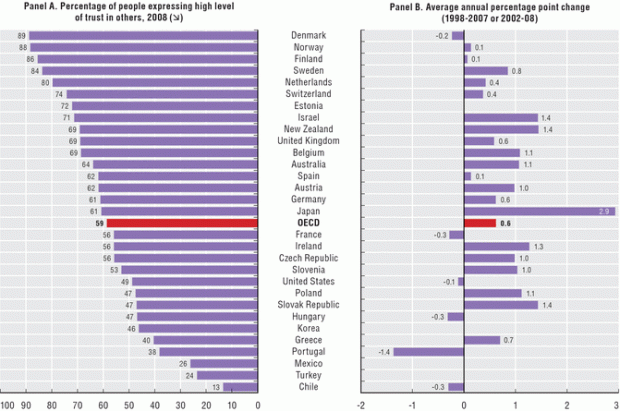It was one of those normal evenings during my last months in Turkey. I was laying on the couch after dinner, surfing the internet. I was basically just cruising around, went to some website here, looked up some statistics there, went back to Google, found something, went back, clicked on a link again. And then, suddenly, I was looking at some numbers that made all my scattered understanding of Turkey come together…. What was before my eyes, explained it all. There it was, in black and white… This graph:

The graph shows the percentage of people in the OECD countries expressing high level of trust in others. As you see, Turkey is at the bottom of the list. Only 24 percent of the Turkish people in the survey highly trusted their fellow citizens. Compare that to the Scandinavian countries, where almost everyone seem to trust one and other.
But this is only the OECD countries, I thought… what about the rest of the world?
As I continued to search the internet for other surveys relating to interpersonal trust, I found this world map, and by then I was sure…

…Turkey has a huge problem with trust, may it or may it not be for good reasons. Even compared to other places in the entire world, Turkey sticks out as a country in which people’s trust of each other is surprisingly low. To me, it does not only explain something about peculiarities in it’s society, but it also predicts future problems, not the least relating to economic development.
Lack of interpersonal trust and its consequences
In one way you can say that the foundation of any society is built on trust. To be able to do business with someone, you need to be able to trust that person. The whole capitalistic system in terms of specialization rather then self-sufficieny, is based on trust between individuals. So, what happens in a society with low interpersonal trust?
Well, you can see all the signs in Turkey…
- Where does the extreme social culture come from? – a way to be sure where you have other people?
- The love for the family – are they maybe the only one you can trust?
- A tendency for jealousy – everywhere there is threats to both love and friendships
And in business and politics?
- Shortsightedness – While you’re in power grab as much you can, feed only yourself
- Widespread nepotism and corruption – same as above
- Why is Erdogan personally involved in everything? – he doesn’t trust anyone else
And of course, the lack of trust easily becomes a self-fulfilling prophecy. The situation becomes much like the prisoners dilemma, a vicious cycle hard to break free from, like this:
I know that you will cheat me, so I better cheat you first!
For Turkey to become an advanced economy, lack of trust is not a good thing. The interpersonal trust issue will increasingly become a hinder for economic growth and development. Where there is no trust, the transaction costs are high and a nepotistic society quite effectively makes sure that niether the best individual nor the most suiting company gets the job or the contract.
And maybe not even the love within the family isn’t that great after all? There is a Turkish expression saying, Babana bile güvenme!
It translates: Don’t even trust your father!






